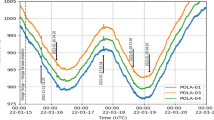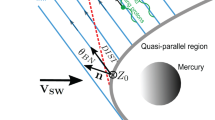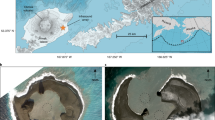Abstract
THE explosion of the Soviet 50 megaton bomb in the vicinity of Novaya Zemlya at approximately 0833 G.M.T. on October 30, 1961, produced pressure oscillations in the atmosphere that were recorded on barograms around the world in much the same manner as the pressure oscillations that followed the eruption of Krakatoa in 1883, when as many as seven passages of the wave-front between Krakatoa and its antipode were observed.1
This is a preview of subscription content, access via your institution
Access options
Subscribe to this journal
Receive 51 print issues and online access
$199.00 per year
only $3.90 per issue
Buy this article
- Purchase on Springer Link
- Instant access to full article PDF
Prices may be subject to local taxes which are calculated during checkout
Similar content being viewed by others
References
Symons, G. J., The Eruption of Krakatoa and Subsequent Phenomena (Trubner and Co., London, 1888).
Carpenter, E. W., et al., Nature, 192, 857 (1961).
Yamamoto, R., Weather, 10, 321 (1955).
Author information
Authors and Affiliations
Rights and permissions
About this article
Cite this article
FARKAS, E. Transit of Pressure Waves through New Zealand from the Soviet 50 Megaton Bomb Explosion. Nature 193, 765–766 (1962). https://doi.org/10.1038/193765a0
Issue Date:
DOI: https://doi.org/10.1038/193765a0
This article is cited by
-
Energetic output of the 2022 Hunga Tonga–Hunga Ha‘apai volcanic eruption from pressure measurements
Shock Waves (2022)
-
Acoustic-Gravity Lamb Waves from the Eruption of the Hunga-Tonga-Hunga-Hapai Volcano, Its Energy Release and Impact on Aerosol Concentrations and Tsunami
Pure and Applied Geophysics (2022)
-
Estimation of Nuclear Explosion Energies from Microbarograph Records
Nature (1971)
-
Fluctuations of Ground-Water Levels due to Atmospheric Pressure Changes from Nuclear Explosions
Nature (1962)
Comments
By submitting a comment you agree to abide by our Terms and Community Guidelines. If you find something abusive or that does not comply with our terms or guidelines please flag it as inappropriate.



